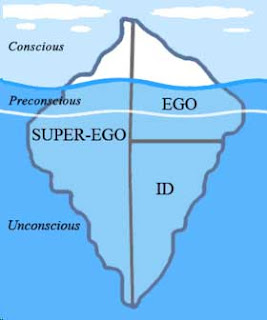Christian Nash
Philosophy 1030
Dr. Oliver
Installment #1
Sigmund Freud and
Consciousness
Freud:
Sigmund Freud, born in
1856, was an Austrian neurologist and founder of psychoanalysis. He began his
medical studies in 1873 in Vienna, later studying in Paris. In 1897, Freud
studied himself and his dreams, and years later, he published The Interpretations of Dreams, “which
explored dreams in terms of
unconscious desires and experiences” (“History”). Freud spent his career
clinically observing and making notes of his patients. After World War One, concentrated
on the application of his theories to history, art, literature and
anthropology. In 1923, he published 'The Ego and the Id', which suggested a new
structural model of the mind, divided into the 'id, the 'ego' and the
'superego' (“History”).
Consciousness:
Freud believed that the mind operated at three different
levels: the preconscious, the conscious, and the unconscious. Each of these
states of mind play an important role in influencing human behavior. Freud used
an iceberg metaphor to explain each level: “The
top of the iceberg that you can see above the water represents the conscious
mind. The part of the iceberg that is submerged below the water but is still
visible is the preconscious. The bulk of the iceberg that lies unseen beneath
the waterline represents the unconscious” (Kendra).
The preconscious is all sensory input
that can potentially enter the conscious mind.
The conscious mind is a composition of
all thoughts, memories, feelings, and wishes that we are aware of at any moment.
This allows us the ability to talk and rational, coherent thinking. “A part of
this includes our memory, which is not always part of consciousness but can be
retrieved easily at any time and brought into our awareness” (Kendra).
The unconscious mind holds feelings,
thoughts, urges, and memories, outside of our conscious awareness. According to
Freud, the unconscious mind is the home of unacceptable or unpleasant contents,
usually painful feelings, memories, or anxiety. “The unconscious continues to
influence our behavior and experience, even though we are unaware of these
underlying influences” (Kendra).
The Id, the Ego and the Superego:
Freud
defines the id, the ego, and the superego as the characteristics of personality
and how a person handles internal conflict.
The id functions on your impulses and pleasures. It tells
you to indulge and enjoy the good things in life. An example of this would be
eating a pint of ice cream before bed and waking up in the morning refusing to
exercise because you are warm in your bed.
The superego controls mainly the unconscious mind. It sets your
morals and is your self-critic. The superego uses guilt as a mechanism to keep
you socially “in-line.” It lets you know whether what you are doing is right or
wrong by causing you guilt by performing something that may not be socially
acceptable.
The ego interprets the reality principle. The id and the
superego are constantly clashing, while the ego relies on the reality principle
to take the desires of the id and the caution of the superego and interpret
those thoughts into real actions (“Freud’s)”.
Works Cited:
“ Freud's
Theory of the Id, Ego & Superego.” Study.com,
Study.com, study.com/academy/lesson/id-ego-and-superego.html.
“History - Sigmund Freud.” BBC, BBC, www.bbc.co.uk/history/historic_figures/freud_sigmund.shtml.
Kendra Cherry | Reviewed by Steven Gans, MD. “What Are Freud's 3
Levels of Mind?”Verywell, www.verywell.com/the-conscious-and-unconscious-mind-2795946.




What do you think? Are Freud's critics who say psychoanalysis is unfalsifiable and therefore not scientifically respectable right? If so, is all this talk of id and superego etc. useful as a literary or culture-critical device?
ReplyDeleteI feel that psychoanalysis isn't something we can discern with pure observation. We can't see that this is happening and prove it Empirically. I feel that leaps have been made with Modern science to better prove some of these theories as to why we do what we do.
ReplyDelete